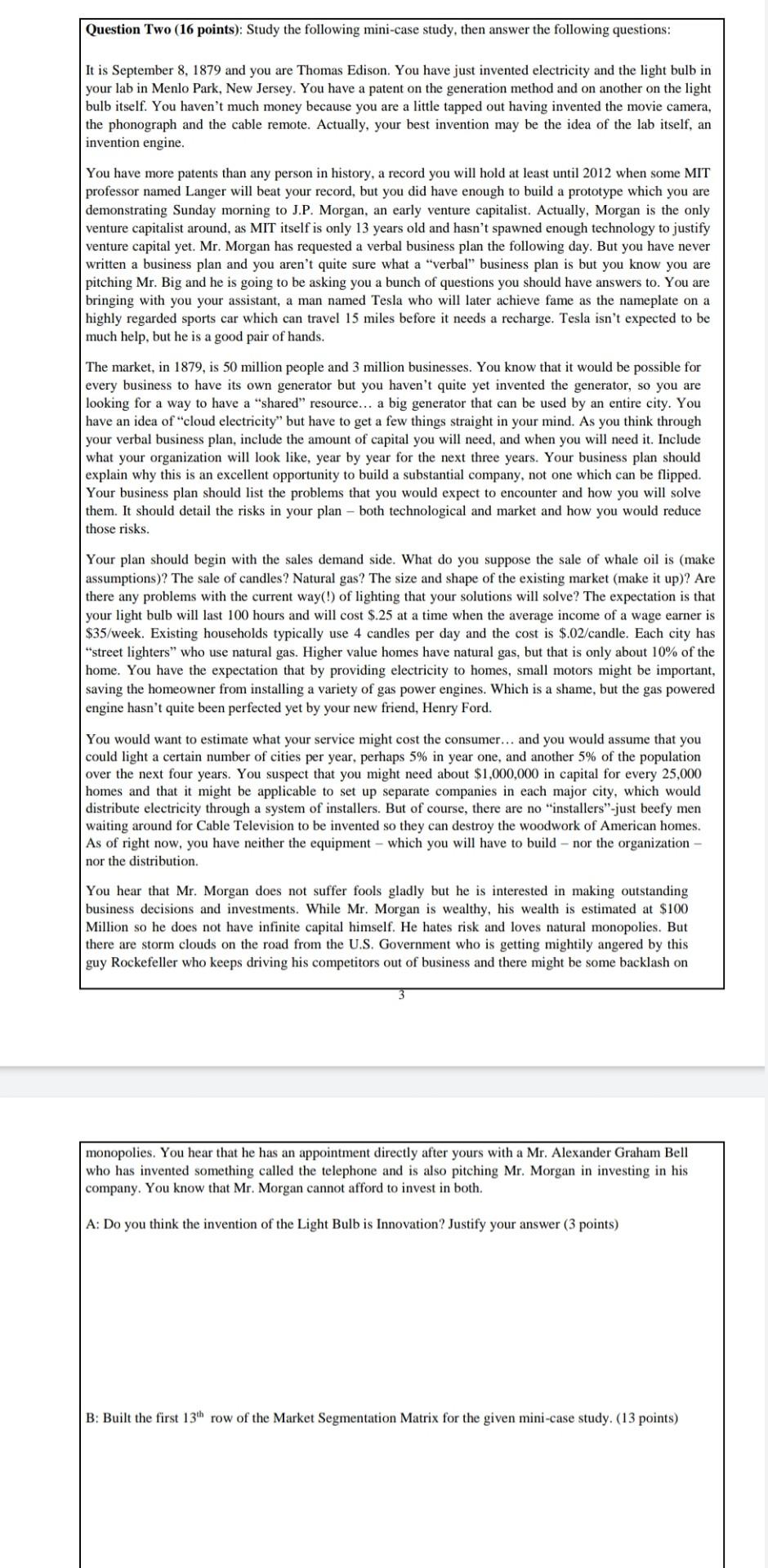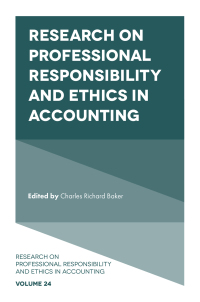Answered step by step
Verified Expert Solution
Question
1 Approved Answer
Question Two (16 points): Study the following mini-case study, then answer the following questions: It is September 8, 1879 and you are Thomas Edison. You

Question Two (16 points): Study the following mini-case study, then answer the following questions: It is September 8, 1879 and you are Thomas Edison. You have just invented electricity and the light bulb in your lab in Menlo Park, New Jersey. You have a patent on the generation method and on another on the light bulb itself. You haven't much money because you are a little tapped out having invented the movie camera, the phonograph and the cable remote. Actually, your best invention may be the idea of the lab itself, an invention engine. You have more patents than any person in history, a record you will hold at least until 2012 when some MIT professor named Langer will beat your record, but you did have enough to build a prototype which you are demonstrating Sunday morning to J.P. Morgan, an early venture capitalist. Actually, Morgan is the only venture capitalist around, as MIT itself is only 13 years old and hasn't spawned enough technology to justify venture capital yet. Mr. Morgan has requested a verbal business plan the following day. But you have never written a business plan and you aren't quite sure what a "verbal business plan is but you know you are pitching Mr. Big and he is going to be asking you a bunch of questions you should have answers to. You are bringing with you your assistant, a man named Tesla who will later achieve fame as the nameplate on a highly regarded sports car which can travel 15 miles before it needs a recharge. Tesla isn't expected to be much help, but he is a good pair of hands. The market, in 1879, is 50 million people and 3 million businesses. You know that it would be possible for every business to have its own generator but you haven't quite yet invented the generator, so you are looking for a way to have a shared" resource... a big generator that can be used by an entire city. You have an idea of cloud electricity" but have to get a few things straight in your mind. As you think through your verbal business plan, include the amount of capital you will need, and when you will need it. Include what your organization will look like, year by year for the next three years. Your business plan should explain why this is an excellent opportunity to build a substantial company, not one which can be flipped. Your business plan should list the problems that you would expect to encounter and how you will solve them. It should detail the risks in your plan - both technological and market and how you would reduce those risks. Your plan should begin with the sales demand side. What do you suppose the sale of whale oil is (make assumptions)? The sale of candles? Natural gas? The size and shape of the existing market (make it up)? Are there any problems with the current way(!) of lighting that your solutions will solve? The expectation is that your light bulb will last 100 hours and will cost $.25 at a time when the average income of a wage earner is $35/week. Existing households typically use 4 candles per day and the cost is $.02/candle. Each city has "street lighters" who use natural gas. Higher value homes have natural gas, but that is only about 10% of the home. You have the expectation that by providing electricity to homes, small motors might be important, saving the homeowner from installing a variety of gas power engines. Which is a shame, but the gas powered engine hasn't quite been perfected yet by your new friend, Henry Ford. You would want to estimate what your service might cost the consumer... and you would assume that you could light a certain number of cities per year, perhaps 5% in year one, and another 5% of the population over the next four years. You suspect that you might need about $1,000,000 in capital for every 25,000 homes and that it might be applicable to set up separate companies in each major city, which would distribute electricity through a system of installers. But of course, there are no "installers"-just beefy men waiting around for Cable Television to be invented so they can destroy the woodwork of American homes. As of right now, you have neither the equipment - which you will have to build - nor the organization nor the distribution. You hear that Mr. Morgan does not suffer fools gladly but he is interested in making outstanding business decisions and investments. While Mr. Morgan is wealthy, his wealth is estimated at $100 Million so he does not have infinite capital himself. He hates risk and loves natural monopolies. But there are storm clouds on the road from the U.S. Government who is getting mightily angered by this guy Rockefeller who keeps driving his competitors out of business and there might be some backlash on monopolies. You hear that he has an appointment directly after yours with a Mr. Alexander Graham Bell who has invented something called the telephone and is also pitching Mr. Morgan in investing in his company. You know that Mr. Morgan cannot afford to invest in both. A: Do you think the invention of the Light Bulb is Innovation? Justify your answer (3 points) B: Built the first 13th row of the Market Segmentation Matrix for the given mini-case study. (13 points)
Step by Step Solution
There are 3 Steps involved in it
Step: 1

Get Instant Access to Expert-Tailored Solutions
See step-by-step solutions with expert insights and AI powered tools for academic success
Step: 2

Step: 3

Ace Your Homework with AI
Get the answers you need in no time with our AI-driven, step-by-step assistance
Get Started


